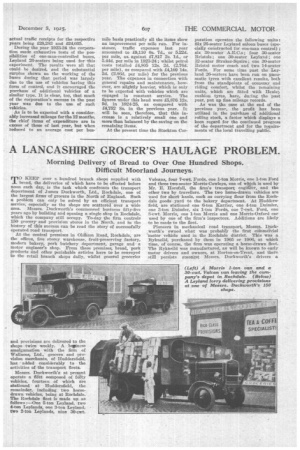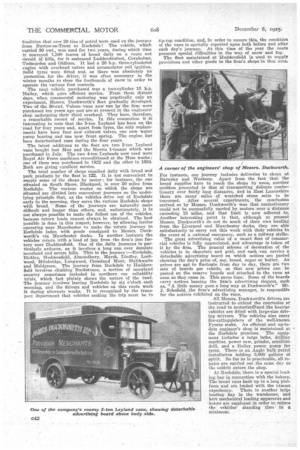A LANCASHIRE GROCER'S HAULAGE PROBLEM.
Page 25

Page 26

If you've noticed an error in this article please click here to report it so we can fix it.
Morning Delivery of Bread . to Over One Hundred Shops, Difficult Moorland Journeys:
TOKn,FP over a hundred branch shops supplied with bread, the deliveries of which have to be effected before noon each day, is the task which confronts the transport department of ;James Duckworth, Ltd., Rochdale, one of the largest firms of grocers in the North of England. Such a problem can only be solved by an efficient transport service, especially as the shops are scattered over a wide area. Messrs. Thickworth's commenced business fifty-five years ago by building and opening a single shop in Rochdale, which the company still occupy. To-day the firm controls 150 grocery, and provision stores in the North, and in the history of this success can be read the story of successfully operated road transport.
At the central premises in Oldham Road, Rochdale, are the offices, five storey warehouse, fruit-preserving factory, modern bakery, pork butchery department, garage and a motor engineer's shop. From these premises, bread, 'pork products and other perishable articles have to be conveyed to the retail branch shops daily, whilst general groceries
VuIcans, four 7-cwt. Fords, one 1-ton Morris, one 1-ton Ford and three two-seater Morris-Cewleys, one of which is used by Mr. E. Horsfall, the firm's transport enginer, and the other two by travellers. The two horse-drawn vehicles are used for short hauls, such as carrying flour from the Rochdale goods -.yard to the bakery department. At Huddersfield, are stationed one 6-ton ICarriee, one 4-ton Daimler, one 3-ton Dalinier, six 1-ton Fords, one 7-cwt. Ford, one S-ewt. Morris, one 1-ton Morris and one Morris-Oxford car used by orie of the firm's inspectors. Additions are likely to be made to the fleet.
Pioneers in mechanical road transport, Messrs. Duckworth' e owned what was probe* the first commercial 'motor vehicle used in the Rochdale district. This was a -Itykneild, purchased by them in 1905 or 1906, at which time, of course, the firm was operating a horse-drawn fleet. The Rykneibi was manufactured, as will be known to early motor drivers and owners, at Burton-on-Trent, and there still persists amongst Messrs. Duckworth's drivers a
tradition that over 20 tins of petrol were used on the journey from Burton-on-Trent to Rochdale ! The vehicle, which carried 30 cwt., was used for two years, during which time it conveyed 1,500 loaves of bread daily on a route not devoid of hills, for it embraced Luddendenfoot, Cornholnie, Todmorden and Oldham. It had a 20 h.p. three-cylindered engine with overhead valves and accumulator coil ignition. Solid tyres were fitted and, as there was absolutely no protection for the driver, it was often necessary in the winter months to clear the footboards of snow in order to operate the various foot controls.
The next vehicle purchased was a• two-cylinder 15 h.p. Halley, which gave efficient service. From those distant days, when commercial motoring was practically only an experiment, Messrs. Duckworth's fleet gradually developed. Two of the. 30-cwt. Vulcan vans now run by the firm were purchased ten years ago and arc at present in tile engineers' shop undergoing their third overhaul. They have, therefore, a remarkable record of service. In this connection it is interesting to note that the 5-ton Leyland has been on the road for four years and, apart from tyres, the only replacements have been four new exhaust valves, one new water pump bearing and one new front spring. The engine has been decarbonized once during the four years.
The latest additions to the fleet are two 2-ton Leyland vans bought last May and the Morris 1-tonner which was purchased in July. The two 4-ton Leyland now used were Royal Air Force machines reconditioned at the Ham works ; one of them was purchased in 1922 and the other in 1924. Both are giving excellent service.
The total number of shops supplied daily with bread and pork products by the fleet is 122. It is not convenient to supply some of the shops by motor ; for instance, the one situated on South Shore, Blackpool, is over 50 miles from liochdale. The various routes on which the shops are situated are divided into convenient journeys on the underlying principle that, as the vehicles drive out of Rochdale early in the morning, they serve the various Roehdale shops with bread. Some of the journeys are naturally more difficult and longer than others, and, unfortunately, it is not always possible to make the fullest use of the vehicles, because return loads cannot always be obtained. The best possible is done in this respect, however, by allowing lorries operating near Manchester to make the return journey to Rochdale laden with goods consigned to Messrs. Duckworth's via Manchester docks. In another instance the vehicles return with a load of jam from the firm's jam factory near Huddersfield. One of the daily journeys is particularly arduous, as it involves a long run over desolate moorland and severe hills. This is the journey :—Rochdale, Birkley. Huddersfield, Almondbury, Marsh, Lindley, Lockwood, Milnbridge, Longwood, Crossland Moor, Slaithwaite and Moldgreen. The journey from Rochdale to Huddersfield involves climbing Buckstones, a section of moorland country sometimes included in northern car reliability trials, which fact plainly shows the nature of the road. The journey involves leaving Rochdale by six o'clock each morning, and the drivers and vehicles on this route work It during alternate weeks. It is recognized by the transport department that vehicles making the trip must be in tip-top condition, and, in order to ensure this, the condition of the vans is specially reported upon both before and after each day's journey. At this time of the year the route presents special difficulties in the way of snow and fog.
The fleet maintained at Huddersfield is used to supply provisions and other goods to the firm's shops in that area.
For instance, one journey includes deliveries to shops at Barnsley and Worksop. Apart from the fact that the bread supplies have to reach the shops by noon, another problem presented is that of transporting delicate confectionery over fairly long distances, and in East Lancashire there are runny miles of wretched stone setts to be traversed. After several experiments, the conclusion arrived at by Messrs. Duckworth's was that confectionery could not be successfully carried by motors over a distance exceeding 15 miles, and that limit is now adhered to. Another interesting point is that, although at present Messrs. Duckworth's do not do much of their own hauling from the Liverpool and Manchester docks, they are able satisfactorily to carry out this work with their vehicles in the event of a national emergency, such as a railway strike.
The great advertising value of a smart fleet of commercial vehicles is fully appreciated, and advantage is taken of it by the firm. The general scheme of decoration of the vehicles is in chocolate and gold, and each van carries a detachable advertising board on which notices are pasted showing the day's price of, say, bread, sugar or butter. As prices are apt to fluctuate from day to day, there are two sets of boards per vehicle, so that new prices can be pasted on the reserve boards and attached to the vans as soon as they come in. This saves time. Some of the boards carry notices bearing the firm's advertising slogans, such "A little money goes a long way at Duckvvorth's." Mr. J. Schofield, the firm's advertising manager, is responsible for the notices exhibited on the vans.
All Messrs. Duckworth's drivers are instructed to extend the courtesies of the road to motorists,kand the heavier vehicles are fitted with large-size driving mirrors. The vehicles also carry fire-extinguishers of the well-known Pyrene make. An efficient and up-todate engineer's shop is maintained at the Rochdale premises. Tho equipment includes a large lathe, drilling machine. power saw, grinder, sensitive drill, and a Bailey power pump for tyres. There is an Anglo bulk petrol installation holding 3,000 gallons of spirit. So far as is practicable, all repairs are carried out the same day as the vehicle enters the shop.
At Rochdale, 'there is a special loading bay in connection with the bakery. The bread vans back up to a long platform and are loaded with the utmost
expediency. There is another large loading bay in the warehouse, and here mechanical loading apparatus and hoists are employed in order to reduce the vehicles' standing time to a minimum.
































